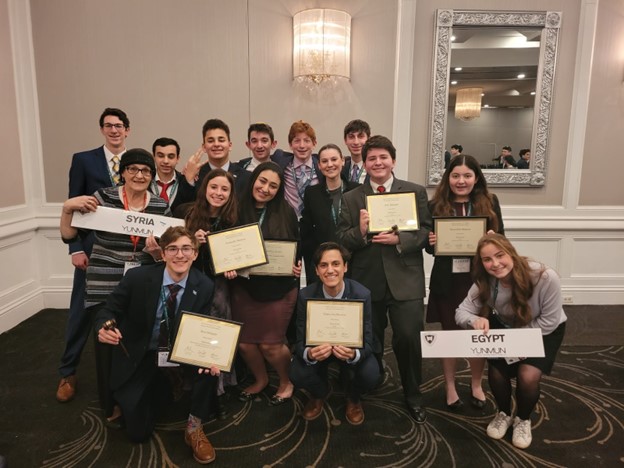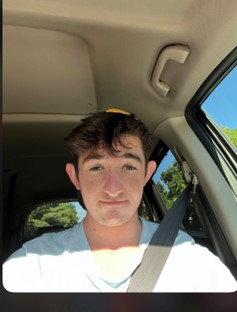YUNMUN XXXIII
April 28, 2022
At assembly in the beginning of the school year, Model United Nations tryouts were announced. A signup sheet in the Jewish History office indicated that there were only a few people signed up, only five of them were seniors. When the fourteen team members were chosen, we received a bright orange sheet of paper congratulating us and reminding us that it was unlikely our conference would be held in person, due to COVID-19.
Every Monday at practice, Mrs. Austen informed us of the conversations behind the scenes discussing whether our conference would occur online like the previous year. Finally, Yeshiva University announced that the conference would be pushed off until March instead of the scheduled February, allowing more time for the Delta variant to pass and a higher possibility of the complete in-person experience. All our waiting paid off when Mrs. Austen announced that our conference would not only occur in person, but would also not require masks.
Despite the attempts of our team captains, Erela I. ‘22 and Gideon R. ‘22, to prepare us for our convention, nothing could have readied us for the spectacle in Connecticut. Dragging our luggage into the hotel where it happens, we were greeted by teams from over thirty Jewish schools all over the country, all who looked bigger and nerdier than our fierce fourteen. A lanyard was handed to us that contained our name, school, country, and committee. While our school as a whole represented Syria and Egypt, only one student from each school was placed into a UN committee like UNESCO, WHO, or UNICEF which had their individual tasks to solve. For example, my committee had two topics: freedom of speech and preserving cultural language diversity. Every couple of seconds somebody would glance at our necklaces to determine whether we shared the same committee. If so, they would initiate small talk to decide if we would form an alliance or become enemies based on our country’s positions on the topics being discussed.
Following what felt like an eternity of pleasantries, it was finally the time to find the debating rooms and place down our placards that indicated our school’s country. When placing down our placards we considered the specific advice from our captains on the strategy that goes into deciding where to sit. If we sat too close to the front of the room, we might become burdened with carrying up other’s notes to the committee head, yet if we remained too far, we might be perceived as an afterthought.
After making this life changing decision, we ate dinner, davened maariv, listened to an hour of speeches, and finally reached the moment we had been preparing for: our first committee meeting. In addition to everything on the schedule, we had also experienced a five hour long bus ride to the conference, so our bodies faced both physical and emotional fatigue. We had also received no sleep the last two nights due to the high school Shabbaton, which only contributed to our fatigue. Walking into the committee, we were not as fresh and well rested as our fellow delegates, yet we proved we were a force to be reckoned with.
While people can try to describe the experience of our Model UN committee, it is difficult to articulate all the emotions flooding through us as we go up to speak. Rather than just performing a speech that we prepared beforehand, we were forced to think on our feet and contribute to the conversation, while the twenty speakers before us stole every one of our ideas. After each person delivers their 45 second statement, two people who raise their plaque are picked to give a 15 second comment. Regardless of the importance of the contribution, it is frowned upon to refrain from raising your plaque because the winners are chosen with great consideration to how often we contribute. I found myself often wishing I was not called on, yet naturally those were the times I was called on most.
Our team gathered together after our first meeting at 10:30 PM to discuss our performance before we went up to bed. Everybody felt confident in their performance, however, we knew this was just the beginning. Throughout the next day we faced around nine hours of committee time. During this period, we were expected to form coalitions with others in our committee and create a working paper and then resolution for two separate topics. In addition, we had to tackle a “crisis,” essentially a third resolution revolving around something funny to lighten the harsh dynamic of the prior meetings. Every grueling hour drained us mentally as we were surrounded by the best of the best from every other school, yet every participant from BT was armed with tools that had been engrained in us by our leaders, Erela, Gideon, and Mrs. Austen.
Unlike most teams, we were composed of only five seniors and many newbies, so we were pleasantly surprised at the award ceremony when Beth Tfiloh won 7 awards: two best delegates, four honorable mentions, and a third place trophy overall for BT. When I first heard I didn’t get an award I felt bad, because despite this being my first year at a conference, I knew I did well and came prepared with a lot of research and ideas. But I felt a lot happier when I learned BT got third. Receiving an award is everybody’s goal, yet this win for BT was not just achieved through the six winners, it was through the hard work of everybody on the team. At each practice everybody absorbed each other’s knowledge and we all came to the conference being our best selves, I must reiterate, each committee was filled with the best and brightest from every school, all hungry for blood and desperate for a win, and each room had a chair-head looking for their own individual criteria when choosing the winner. So, in reality, every one of us won on Tuesday, whether we have a certificate to show for it, or not.


